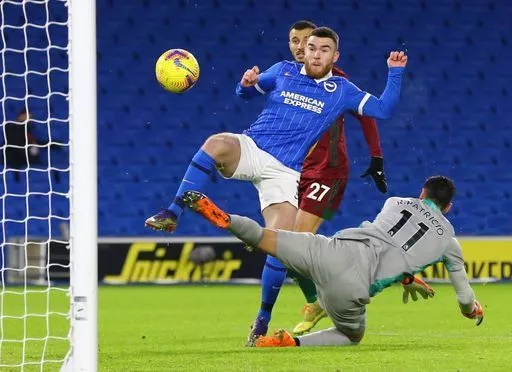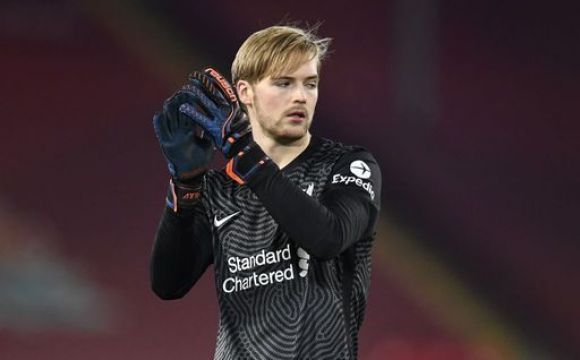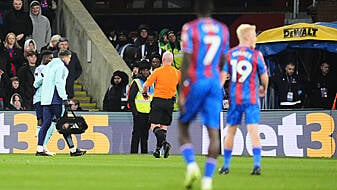The fastest route to success for young Irish footballers has traditionally been a short jump across the water.
However, Brexit has muddied these waters significantly, as it has done in plenty of other parts of life.
Robbie Keane, Niall Quinn, Richard Dunne, John O'Shea, the list of top Irish players who moved to England before the age of 18 goes on and on.
Of the current crop of Irish talent, the likes of Troy Parrott, Aaron Connolly and Caoimhin Kelleher are examples of players who made their dream moves to English sides at a young age.

This tried and trusted path is now in doubt for Irish players though, at least those south of the border.
FIFA has announced a 'Brexit exemption' for players aged under 18 to move to England from Scotland, Wales and Northern Ireland.
Irish players aged over 18 will still be able to freely move to England due to the Common Travel Area (CTA), but for many this could be too late as the years before that are crucial in a player's development.
With no word on a Brexit exemption for players from the Republic, some players will be left in limbo.
Sports lawyer Jonny Madill, of Sheridan Sports, spoke to BreakingNews.ie about the uncertain situation and how it may develop.
“Any Irish player over 18 doesn’t have to worry because the CTA effectively supersedes what any other rules say,” Mr Madill explained.
“When it comes to Irish players between the age of 16 and 18 it does get a little more complex. The general starting point is that FIFA regulations on the status and transfer of player say that international transfers are only permitted if a player is over-18, but for under-18 players an exception to that rule is if the transfer takes place in the territory of EU/EEA. Obviously the UK has left EU/EEA which means that clearly on the face of it there is a problem.
“In early December, FIFA met and amended their regulations to clarify that the transfer of players aged 16-18 between ‘UK’ member associations is fine. In other words a player can move between England, Scotland, Wales and Northern Ireland associations, ie within the UK bubble, without there being any difficulty.
“It was pretty clear that the Republic of Ireland was not included in that UK ‘state’, was the term used.”
Mr Madill feels the most likely route for a change or exemption in the rule would be a ruling from FIFA.
He feels the most effective way to achieve this would be lobbying from the FAI and English, Scottish and Welsh associations.
“A number of people have asked me what would have to happen for the position to change, I don’t have a crystal ball but I think FIFA would have to come out and clarify that there is a further exception being made and that is 16-18 year old Irish based players can move.
“There hasn’t been any sign of that so as far as I’m concerned Irish football needs to get its head around it.
“The course of least resistance would be to try and lobby FIFA to make an exception and to change its regulation.
“That should come from the FAI in conjunction with other key governing bodies, like the FA, EFL, Premier League, Scottish and Welsh FAs.
“It would effectively be the associations and leagues coming together to try and lobby FIFA, saying ‘look, clearly there’s a gap here in what the rule should be, can you make an exception?’”
Legal challenge
If that route doesn’t work the alternative approach would be for someone to bring a legal challenge, whether it's a player or a group of players.
Mr Madill feels that would be a very difficult prospect as the basis of the argument against FIFA rules and regulations would be questionable.
“If you were to bring a challenge against FIFA, they would probably turn around and say ‘these are our regulations, they’ve always been in place, it’s not our fault that Brexit happened’.
“There’s nothing to stop a collective group of a number of players coming together, but I think it’s going to carry more weight if it’s done by a governing body, ie the FAI.”
He added: “For me the big thing is what is the legal argument? What is the basis of the claim?
“What legal argument would a player or anyone else run with when challenging the regulations of the world governing body that is responsible for the status and transfer of players?
“It would be a huge undertaking to challenge this. Any lawyer would need to be very creative in trying to come up with something.
“Before getting into the ifs and buts of whether a player could bring a claim it’s....'well actually, what part of the regulations are unfair or unlawful?'”
While legal challenges and endless talks could be a never-ending process, Mr Madill feels the FAI could see the situation as a new opportunity, to develop youth structures here or forge partnerships with European leagues.
“You’re now not going to lose 40-50 players a year, this is an opportunity to develop them at home and prove your structures or you can say, ‘we’re going to develop links with clubs in Belgium, Germany or Spain’.
“It makes sense to develop relationships with clubs, not necessarily in the top tiers of Germany, Spain, Italy etc it could be Denmark, Belgium, Switzerland.
“It’ll be interesting to see what the FAI will do about it, I think they’re probably waiting to see how it plays out because they’ve got other things to worry about at the minute.
“One way of looking at it is, this could be very damaging to Irish football, the other is that this could be an opportunity to start doing things differently.”
Clearly they benefit from young Irish talent but are they going to want to go against FIFA and bring a legal challenge?
The only certainty of the legal route would be large costs, according to Mr Madill.
He also feels getting the backing of the other associations would be crucial.
“It wouldn’t be cheap, it would take time and chances of success could be low. You could even end up in a worse position with an unsuccessful legal challenge.
“If the FAI phone up the FA, Premier League, EFL, Scottish FA and Welsh FA and say 'will you support us on this?', I don’t know the answer but would those bodies necessarily be that bothered?
“Clearly they benefit from young Irish talent but are they going to want to go against FIFA and bring a legal challenge?
“This is all completely new, there’s no blueprint, as a lawyer we haven’t seen anything like this before because Brexit is unprecedented and the relationship between Brexit and employment law and football regulations don’t always marry up, which is the problem here.
“50 or 60 Irish players between 16 and 18 [years of age] move to the UK every year, that’s a significant amount of talent.”







